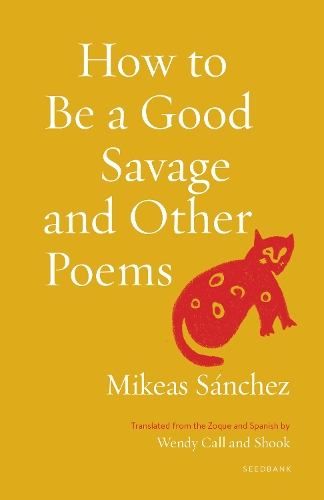
How to Be a Good Savage and Other Poems
(Paperback)
Publishing Details
How to Be a Good Savage and Other Poems
By (Author) Mikeas Snchez
Translated by Wendy Call
Translated by Shook
Introduction by Jake Skeets
Milkweed Editions
Milkweed Editions
17th April 2024
United States
Classifications
General
Non Fiction
Anthologies
Indigenous peoples / Indigeneity
Literary studies: poetry and poets
897.43
Physical Properties
Paperback
224
Width 165mm, Height 215mm
Description
The latest in the Seedbank series, the debut in English of a groundbreaking Indigenous poet of the Americas.
In a fiercely personal yet authoritative voice, prolific contemporary poet Mikeas Snchez explores the worldview of the Zoque people of southern Mexico.Her paced, steely lyrics fuse cosmology, lineage, feminism, and environmental activism into a singular body of work that stands for the self and the collective in the same instant. I am woman and I celebrate every vein, she writes, where I guard my ancestors secrets / every Zoque mans word in my mouth / every Zoque womans wisdom in my spit.
How to Be a Good Savage and Other Poems examines the intersection of Zoque struggles against colonialism and empire, and those of North African immigrants and refugees. Snchez encountered the latter in Barcelona as a revelation, spreading their white blankets on the ground / as if theyll soon return to sea / flying the sail of the promised land / the land that became a mirage. Other works bring us just as close to similarly imperiled relatives, ancestors, gods, and archetypal Zoque men and women that Snchez addresses with both deeply prophetic and childlike love.
Coming from the only woman to ever publish a book of poetry in Zoque and Spanish, this timely, powerful collection pairs the bilingual originals with an English translation for the first time. This book is for anyone interested in poetry as knowledge, proclaimed with both feet squarely set on ancient ground.
Reviews
Praise for the Seedbank Series
Milkweeds Seedbank series is one of the most exciting and visionary projects in contemporary publishing. Taking the long view, these volumes run parallel to the much-hyped books of the moment to demonstrate the possibility and hope inherent in all great literature.Stephen Sparks, Point Reyes Books
Through its cultural-linguistic contribution to narrative diversity, Milkweed's Seedbank series is a vital tool in imagining the futures possible for humanity beyond the anthropocene. Bringing works from Greek, K'iche', German, Russian (and more!) whose authors are deeply rooted in their homelands, each voice encountered has resonated with me on a seemingly cellular levelshifting and changing both who I am and can be. I will continue to press these books into the hands of compassionate readers and cannot wait to share the forthcoming titles in the project!Erin Pineda from 27th Letter Books
Milkweed as a publishing house has long been championing literary works both fictitious and true to life centered around culture, nature, and environmentalism. The Seedbank series serves as both a marvelous introduction to the books Milkweed provides and as a collection of essential stories that ought to be on everyone's radar. The words behind these front covers highlight life-changing experiences, knowledge, and ways of life from communities that are seldom otherwise heard from in the publishing world through an authentic cultural lens. What I've read from the Seedbank line is phenomenal, and I look forward to spending time with future works in the series.Andrew King from Secret Garden Books
Author Bio
Mikeas Snchez is the author of How to Be a Good Savage and Other Poems. She is one of the most important poets of the Indigenous Americas, working in Zoque, a language spoken in southern Mexico. She is the only woman to have ever published a book of poetry in that language. Her six volumes of poetryincluding Mokaya / Mojk'Jy and Mumure' t' yjktamb / Todos somos cimarronesare all bilingual Spanish-Zoque. Snchezs work has been translated into Bangla, Catalan, English, German, Italian, Maya, Mixe, and Portuguese. In Chiapas, Mexico, she was awarded first place in the Y el Bolm dice . . . Prize for Fiction as well as the Pat Otan Prize for Indigenous Poetry. Snchez is a radio producer, translator, community health promoter, and defender of Zoque lands. She lives in Ajway, Chiapas.
Wendy Call is co-editor of Telling True Stories: A Nonfiction Writers Guide and Best Literary Translations, author of the award-winning No Word for Welcome, and translator of two collections of poetry by Mexican-Zapotec poet Irma Pineda: In the Belly of Night and Other Poems and Nostalgia Doesnt Flow Away Like Riverwater. Her literary projects have been supported by Artist Trust, the Fulbright Commission, and the National Endowment for the Arts. Call serves on the faculty of the Rainier Writing Workshop MFA program and lives in Seattle, on Duwamish land, and in Oaxaca, Mexico, on Mixtec and Zapotec land.
Shook is a poet, translator, and editor whose work has spanned a wide range of languages and places. Their writing has appeared in Poetry, World Literature Today, the Guardian, and many other publications, as well as being translated into more than a dozen languages, including Isthmus Zapotec, Kurdish, and Uyghur. Since founding Phoneme Media in 2013, Shook has edited and published translations from over thirty-five languages. Today they direct Kashkul Books, a publishing project based in the Kurdistan Region of Iraq, as well as the translation-focused imprint avin at Gato Negro Ediciones in Mexico City. They reside at Newt Beach in Northern California.
